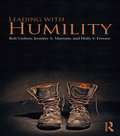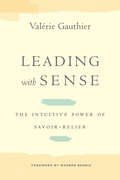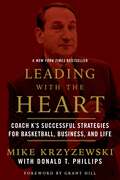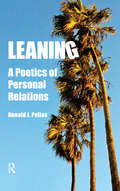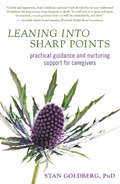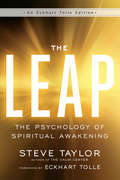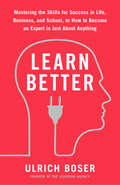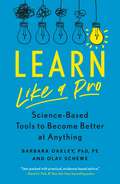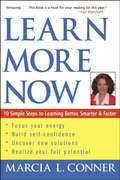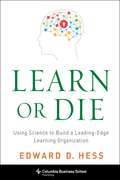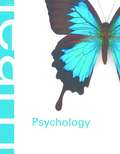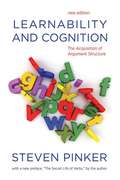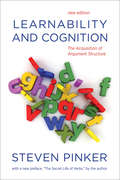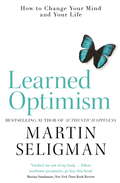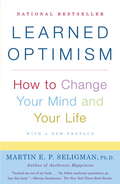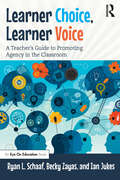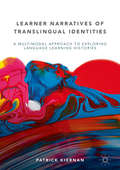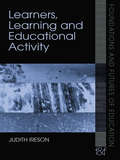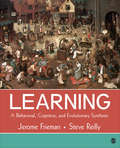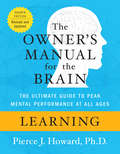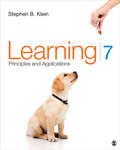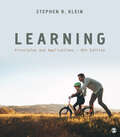- Table View
- List View
Leading with Humility
by Rob Nielsen Jennifer A. Marrone Holly S. FerraroThe media is saturated with images of leaders as powerful, headstrong individuals, who are certain of their position and willing to do whatever it takes to achieve their organizational goals or personal ambitions. In reality, far too often, a leader’s ego gets in the way of sound decision making, adversely affecting the organization and the individuals involved. This insightful book, based on cutting edge research, advances a new model for understanding effective leadership. Nielsen, Marrone and Ferraro advocate the idea of leading with humility, a trait that is rarely discussed and frequently misunderstood. Humble leaders consider their own strengths, weaknesses and motives in making decisions, demonstrating concern for the common good, and exercising their influence for the benefit of all. Leading with Humility offers students and leaders clarity in understanding the connection between leadership and humility, and teaches them how to enhance their own abilities to become better leaders.
Leading with Sense: The Intuitive Power of Savoir-Relier
by Valérie GauthierToday's business environment demands a new approach to leadership, one that effectively connects individuals and organizations in the midst of change. Leading with Sense offers a new, practical approach to meeting this challenge. Drawing on her experience as a poetic translator and her expertise in cross-cultural leadership, Valérie Gauthier outlines the tenets of savoir-relier: a framework for building sensible, trustworthy, and lasting relationships that enables leaders to value difference, work across boundaries, and navigate complex systems. Savoir-relier teaches leaders to tap into their senses in the midst of strategizing, allowing them to act intuitively and rationally at once. Few leaders dare to claim that their "gut feelings" are critical to their decisions. But, by engaging their intuition, they are able to draw on experience, better appreciate their environment, build confidence, and summon the courage to tackle the task at hand. Leading with Sense trains readers to be poets and translators in the business context. With savoir-relier, we can write our own stories, deciphering the challenges that we face with acumen, humility, and respect. Using real-world examples of this pioneering approach, Gauthier provides readers with methods and tools for cultivating a savoir-relier mindset to build positive relationships, nurture diversity, drive mindful innovation, and foster success.
Leading with the Heart: Coach K'S Successful Strategies for Basketball, Business, and Life
by Mike Krzyzewski Donald T. Phillips Grant HillIn some respects, a top-level college coach is a lot like a manager in any business. He has to turn a group of talented individuals into a smoothly running team, and he has to produce results that please the fans of his team--the shareholders of the athletic program. Thus, in Leading with the Heart, Krzyzewski reviews the lessons he's learned as basketball coach at Duke University, and tries to universalize them so they translate to any leadership position. For example, he writes, "Adjustments are not unusual, they are usual. So a leader's ability to think on his feet ... to do things without instruction ... is of paramount importance." Makes sense, as does this admonition: "When teaching, always remember this simple phrase: 'You hear, you forget. You see, you remember. You do, you understand.'" The book has four sections--"Preseason," "Regular Season," "Postseason," and "All-Season"--and each of those has four chapters. Each chapter begins with three quotes ("Too many rules get in the way of leadership" leads off chapter 1), and ends with bulleted tips summing up the chapter's message. Between the quotes and the bullet points are anecdotes about Duke basketball games and (occasionally) Krzyzewski's life outside basketball. What you come away with is an understanding of why Krzyzewski is a great basketball coach, why former Duke assistants such as Tommy Amaker and Quin Snyder are probably going to become great basketball coaches, and how anyone who's currently a coach can become a better coach. It would be great if other types of managers in other types of businesses could incorporate these lessons in compassionate, focused, highly flexible leadership, but it seems unlikely. Most managers in business rise through the ranks not because of their ability to lead or inspire but because of their knowledge and competence (if not their connections). On the other hand, it would be nice if each of us, just once, could work for someone like Coach K, someone who could push the right buttons and lead us to our own version of the Final Four. Not likely, but a pretty sweet fantasy. --Lou Schuler
Leaning: A Poetics of Personal Relations (Writing Lives: Ethnographic Narratives)
by Ronald J PeliasRonald J Pelias explores leaning as a metaphor for analyzing interpersonal interaction. Bodies leaning toward one another are engaged, developing the potential for long-lasting, meaningful relationships. But this ideal is not often realized. Pelias makes use of a wide variety of tools such as personal narrative, autoethnography, poetic inquiry and performative writing in his exploration of the physical space of relationships. This deeply personal work is essential for scholars and students of qualitative research and autoethnography.
Leaning into Sharp Points
by Stan GoldbergWhether you're coping with a loved one who has received a terminal diagnosis, has a long-term illness or disability, or suffers with dementia, caregiving is challenging and crucial. Those who face this responsibility, whether occasionally or 24/7, are brushing up against life's sharpest point. In this book, Stan Goldberg offers an honest, caring, and comprehensive guide to those on this journey. Everyone wants to "do the right thing," and this book provides the often-elusive how-to; from bedside etiquette to advice on initiating difficult conversations, caring for oneself while caring for another, navigating rapid changes in your loved one's condition, and even offering "permission" for them to die. Goldberg's stories demonstrate how to address the most difficult topics and will facilitate more open and useful communication and caregiving.
The Leap: The Psychology of Spiritual Awakening
by Eckhart Tolle Steve TaylorWhat does it mean to be enlightened or spiritually awakened? In The Leap, Steve Taylor shows that this state is much more common than is generally believed. He shows that ordinary people — from all walks of life — can and do regularly “wake up” to a more intense reality, even if they know nothing about spiritual practices and paths. Wakefulness is a more expansive and harmonious state of being that can be cultivated or that can arise accidentally. It may also be a process we are undergoing collectively. Drawing on his years of research as a psychologist and on his own experiences, Taylor provides what is perhaps the clearest psychological study of the state of wakefulness ever published. Above all, he reminds us that it is our most natural state — accessible to us all, anytime, anyplace.
Learn Better: Mastering the Skills for Success in Life, Business, and School, or, How to Becom e an Expert in Just About Anything
by Ulrich BoserFor centuries, experts have argued that learning was about memorizing information: You're supposed to study facts, dates, and details; burn them into your memory; and then apply that knowledge at opportune times. But this approach to learning isn’t nearly enough for the world that we live in today, and in Learn Better journalist and education researcher Ulrich Boser demonstrates that how we learn can matter just as much as what we learn.In this brilliantly researched book, Boser maps out the new science of learning, showing how simple techniques like comprehension check-ins and making material personally relatable can help people gain expertise in dramatically better ways. He covers six key steps to help you “learn how to learn,” all illuminated with fascinating stories like how Jackson Pollock developed his unique painting style and why an ancient Japanese counting device allows kids to do math at superhuman speeds. Boser’s witty, engaging writing makes this book feel like a guilty pleasure, not homework.Learn Better will revolutionize the way students and society alike approach learning and makes the case that being smart is not an innate ability—learning is a skill everyone can master. With Boser as your guide, you will be able to fully capitalize on your brain’s remarkable ability to gain new skills and open up a whole new world of possibilities.
Learn Like a Pro: Science-Based Tools to Become Better at Anything
by Barbara Oakley PhD Olav ScheweA book for learners of all ages containing the best and most updated advice on learning from neuroscience and cognitive psychology. Do you spend too much time learning with disappointing results? Do you find it difficult to remember what you read? Do you put off studying because it’s boring and you’re easily distracted? This book is for you.Dr. Barbara Oakley and Olav Schewe have both struggled in the past with their learning. But they have found techniques to help them master any material. Building on insights from neuroscience and cognitive psychology, they give you a crash course to improve your ability to learn, no matter what the subject is. Through their decades of writing, teaching, and research on learning, the authors have developed deep connections with experts from a vast array of disciplines. And it’s all honed with feedback from thousands of students who have themselves gone through the trenches of learning. Successful learners gradually add tools and techniques to their mental toolbox, and they think critically about their learning to determine when and how to best use their mental tools. That allows these learners to make the best use of their brains, whether those brains seem “naturally” geared toward learning or not. This book will teach you how you can do the same.
Learn More Now: 10 Simple Steps to Learning Better, Smarter, and Faster
by Marcia L. ConnerThis book is part road map, part blueprint, and part magical decoder ring, all rolled into one. The primary purpose of this book is to help you create a meaningful and fulfilling life by embracing the nature of continual learning. Its also about more than just learning. Learn More Now will help you become more aware, more focused, aligned with your natural pace, and improvisational in whatever you do. It will encourage you to learn your own life's lessons, and grow into your potential.
Learn or Die: Using Science to Build a Leading-Edge Learning Organization (Columbia Business School Publishing)
by Edward HessTo compete with today's increasing globalization and rapidly evolving technologies, individuals and organizations must take their ability to learn—the foundation for continuous improvement, operational excellence, and innovation—to a much higher level. In Learn or Die, Edward D. Hess combines recent advances in neuroscience, psychology, behavioral economics, and education with key research on high-performance businesses to create an actionable blueprint for becoming a leading-edge learning organization. Learn or Die examines the process of learning from an individual and an organizational standpoint. From an individual perspective, the book discusses the cognitive, emotional, motivational, attitudinal, and behavioral factors that promote better learning. Organizationally, Learn or Die focuses on the kinds of structures, culture, leadership, employee learning behaviors, and human resource policies that are necessary to create an environment that enables critical and innovative thinking, learning conversations, and collaboration. The volume also provides strategies to mitigate the reality that humans can be reflexive, lazy thinkers who seek confirmation of what they believe to be true and affirmation of their self-image. Exemplar learning organizations discussed include the secretive Bridgewater Associates, LP; Intuit, Inc.; United Parcel Service (UPS); W. L. Gore & Associates; and IDEO.
Learn Psychology
by Kenneth Carter Colleen SeifertLearn Psychology offers a comprehensive yet accessible presentation of psychology principles, research and theory. Each chapter is carefully structured to cover the topics and concepts of a standard introductory psychology course with associated learning objectives and assessments. Multiple influences are discussed at the end of each chapter wrapping up the chapter presentation. With Learn Psychology, students will find an engaging writing style supported by a pedagogical approach that invites critical analysis, all while building a deeper knowledge of psychology.
Learnability and Cognition: The Acquisition of Argument Structure (new edition)
by Steven PinkerBefore Steven Pinker wrote bestsellers on language and human nature, he wrote severaltechnical monographs on language acquisition that have become classics in cognitive science. Learnability and Cognition, first published in 1989, brought together two bigtopics: how do children learn their mother tongue, and how does the mind represent basic categoriesof meaning such as space, time, causality, agency, and goals? The stage for this synthesis was setby the fact that when children learn a language, they come to make surprisingly subtle distinctions:pour water into the glass and fill the glass with water soundnatural, but pour the glass with water and fill water into theglass sound odd. How can this happen, given that children are not reliably corrected foruttering odd sentences, and they don't just parrot back the correct ones they hear from theirparents? Pinker resolves this paradox with a theory of how children acquire the meaning and uses ofverbs, and explores that theory's implications for language, thought, and the relationship betweenthem. As Pinker writes in a new preface, "The Secret Life of Verbs," thephenomena and ideas he explored in this book inspired his 2007 bestseller The Stuff ofThought: Language as a Window into Human Nature. These technical discussions, he notes,provide insight not just into language acquisition but into literary metaphor, scientificunderstanding, political discourse, and even the conceptions of sexuality that go intoobscenity.
Learnability and Cognition, new edition: The Acquisition of Argument Structure (Learning, Development, and Conceptual Change)
by Steven PinkerA classic book about language acquisition and conceptual structure, with a new preface by the author, "The Secret Life of Verbs."Before Steven Pinker wrote bestsellers on language and human nature, he wrote several technical monographs on language acquisition that have become classics in cognitive science. Learnability and Cognition, first published in 1989, brought together two big topics: how do children learn their mother tongue, and how does the mind represent basic categories of meaning such as space, time, causality, agency, and goals? The stage for this synthesis was set by the fact that when children learn a language, they come to make surprisingly subtle distinctions: pour water into the glass and fill the glass with water sound natural, but pour the glass with water and fill water into the glass sound odd. How can this happen, given that children are not reliably corrected for uttering odd sentences, and they don't just parrot back the correct ones they hear from their parents? Pinker resolves this paradox with a theory of how children acquire the meaning and uses of verbs, and explores that theory's implications for language, thought, and the relationship between them.As Pinker writes in a new preface, "The Secret Life of Verbs," the phenomena and ideas he explored in this book inspired his 2007 bestseller The Stuff of Thought: Language as a Window into Human Nature. These technical discussions, he notes, provide insight not just into language acquisition but into literary metaphor, scientific understanding, political discourse, and even the conceptions of sexuality that go into obscenity.
Learned Optimism: How to Change Your Mind and Your Life
by Martin SeligmanFrom the bestselling author of Authentic HappinessKnown as the father of the science of positive psychology, Martin E.P. Seligman draws on more than twenty years of clinical research to demonstrate how optimism enhances the quality of life, and how anyone can learn to practice it. Offering many simple techniques, Dr. Seligman explains how to break an 'I give up' habit, develop a more constructive explanatory style for interpreting your behaviour, and experience the benefits of a more positive interior dialogue. These skills can help break up depression, boost your immune system, better develop your potential, and make you happier. With generous additional advice on how to encourage optimistic behaviour at school, at work and in children, Learned Optimism is both profound and practical, making it highly valuable for every phase of life.
Learned Optimism: How to Change Your Mind and Your Life
by Martin E. SeligmanKnown as the father of the new science of positive psychology, Martin E.P. Seligman draws on more than twenty years of clinical research to demonstrate how optimism enhances the quality of life, and how anyone can learn to practice it. Offering many simple techniques, Dr. Seligman explains how to break an "I-give-up" habit, develop a more constructive explanatory style for interpreting your behavior, and experience the benefits of a more positive interior dialogue. These skills can help break up depression, boost your immune system, better develop your potential, and make you happier. With generous additional advice on how to encourage optimistic behavior at school, at work and in children, Learned Optimism is both profound and practical--and valuable for every phase of life.
Learner Choice, Learner Voice: A Teacher’s Guide to Promoting Agency in the Classroom
by Ryan L Schaaf Becky Zayas Ian JukesLearner Choice, Learner Voice offers fresh, forward-thinking supports for teachers creating an empowered, student-centered classroom. Learner agency is a major topic in today’s schools, but what does it mean in practice, and how do these practices give students skills and opportunities they will need to thrive as citizens, parents, and workers in our ever-shifting climate? Showcasing authentic activities and classrooms, this book is full of diverse instructional experiences that will motivate your students to take an agile, adaptable role in their own learning. This wealth of pedagogical ideas – from specific to open-ended, low-tech to digital, self-expressive to collaborative, creative to critical – will help you discover the transformative effects of providing students with ownership, agency, and choice in their learning journeys.
Learner Narratives of Translingual Identities: A Multimodal Approach to Exploring Language Learning Histories
by Patrick KiernanThis book addresses translingual identities through an innovative multimodal analysis of the language learning histories of a class of advanced learners of English in Japan who grew up between two or more languages. The author explores both the translingual experiences of those in the classroom and how they use language and gesture when describing their experiences to each other. This approach uses three perspectives: it looks at the worlds and identities the interviewees construct for themselves; at their interpersonal communication; and at the way they frame their experience. Finally, it offers some lessons based on the observations of the class which reveal the values they share and the key to their success as language learners. It will appeal to applied linguistic and educational researchers, particularly those with an interest in narrative approaches to exploring educational contexts, as well as language educators and policy makers interested in gaining a learner perspective on language learning.
Learners, Learning and Educational Activity (Foundations and Futures of Education)
by Judith IresonLearners, Learning and Educational Activity offers a new and creative approach to the psychology of learning. The central idea in the book is that learning in schools and other educational settings is best understood by paying attention to both individual learners and the educational contexts in which learning takes place. Providing an accessible introduction to new ideas and recent developments in cognitive and socio-cultural perspectives on learning, the book reviews advances in selected topics that are especially relevant for teachers and other educators. These include: learners’ conceptions of the nature of learning the development of advanced levels of learning and thinking the role of motivation and self-regulation in learning how learning and thinking relate to social and cultural contexts the ways in which these contexts influence interactions between teachers and learners. By illustrating connections between individual and social aspects of learning in educational settings in and out of school, the book encourages teachers, parents and other educators to think about learners and learning in new ways.
Learning: A Behavioral, Cognitive, and Evolutionary Synthesis
by Jerome Frieman Stephen ReillyLearning: A Behavioral, Cognitive, and Evolutionary Synthesis provides an integrated account of the psychological processes involved in learning and conditioning and their influence on human behavior. With a skillful blend of behavioral, cognitive, and evolutionary themes, the text explores various types of learning as adaptive specialization that evolved through natural selection. Robust pedagogy and relevant examples bring concepts to life in this unique and accessible approach to the field.
Learning: A Behavioral, Cognitive, and Evolutionary Synthesis (Psychology Ser.)
by Jerome Frieman Stephen ReillyLearning: A Behavioral, Cognitive, and Evolutionary Synthesis provides an integrated account of the psychological processes involved in learning and conditioning and their influence on human behavior. With a skillful blend of behavioral, cognitive, and evolutionary themes, the text explores various types of learning as adaptive specialization that evolved through natural selection. Robust pedagogy and relevant examples bring concepts to life in this unique and accessible approach to the field.
Learning: The Owner's Manual
by Pierce HowardCutting-edge, user-friendly, and comprehensive: the revolutionary guide to the brain, now fully revised and updatedAt birth each of us is given the most powerful and complex tool of all time: the human brain. And yet, as we well know, it doesn't come with an owner's manual--until now. In this unsurpassed resource, Dr. Pierce J. Howard and his team distill the very latest research and clearly explain the practical, real-world applications to our daily lives. Drawing from the frontiers of psychology, neurobiology, and cognitive science, yet organized and written for maximum usability, The Owner's Manual for the Brain, Fourth Edition, is your comprehensive guide to optimum mental performance and well-being. It should be on every thinking person's bookshelf. What are the ingredients of happiness? Which are the best remedies for headaches and migraines? How can we master creativity, focus, decision making, and willpower? What are the best brain foods? How is it possible to boost memory and intelligence? What is the secret to getting a good night's sleep? How can you positively manage depression, anxiety, addiction, and other disorders? What is the impact of nutrition, stress, and exercise on the brain? Is personality hard-wired or fluid? What are the best strategies when recovering from trauma and loss? How do moods and emotions interact? What is the ideal learning environment for children? How do love, humor, music, friendship, and nature contribute to well-being? Are there ways of reducing negative traits such as aggression, short-temperedness, or irritability? What is the recommended treatment for concussions? Can you delay or prevent Alzheimer's and dementia? What are the most important ingredients to a successful marriage and family? What do the world's most effective managers know about leadership, motivation, and persuasion? Plus 1,000s more topics!
Learning: Principles and Applications
by Stephen B. KleinIncorporating the latest scholarship and applications in the field, Learning: Principles and Applications, Seventh Edition shows students the relevance of basic learning processes through real-world examples, vignettes, critical thinking questions, and applications. Acclaimed for its accessible and thorough coverage of both classic and current studies of animal and human research, the book is known for its scholarship and easy-to-read style, and the introduction of concepts and theories within the framework of highly effective pedagogical elements, the new edition has been updated and reorganized into twelve chapters to reflect recent changes in the field.
Learning: Principles and Applications
by Stephen B. KleinLearning: Principles and Applications by Stephen B. Klein provides students a current, comprehensive, and engaging introduction to the psychology of learning. Praised for its easy-to-read style and presentation of important contributions of both human and nonhuman animal research, the text helps readers understand the process of learning with coverage of classic experiments, contemporary research, real-world examples, applications, chapter-opening vignettes, and critical thinking questions. The Eighth Edition features expanded sections on theories of conditioning, a streamlined organization through two separate chapters on memory storage and retrieval, and enhanced pedagogy to better connect the material to the everyday lives of students.
Learning: Principles and Applications
by Stephen B. KleinLearning: Principles and Applications by Stephen B. Klein provides students a current, comprehensive, and engaging introduction to the psychology of learning. Praised for its easy-to-read style and presentation of important contributions of both human and nonhuman animal research, the text helps readers understand the process of learning with coverage of classic experiments, contemporary research, real-world examples, applications, chapter-opening vignettes, and critical thinking questions. The Eighth Edition features expanded sections on theories of conditioning, a streamlined organization through two separate chapters on memory storage and retrieval, and enhanced pedagogy to better connect the material to the everyday lives of students.
Learning, 5th Edition
by A. Charles CataniaThe 5th Edition surveys the major areas in the psychology of learning from a consistent behavioral point of view. Learning explores the continuities between human learning and the learning of other animals. The book organizes the phenomena of learning in a systematic way, moving from Behavior Without Learning (evolution) to Learning Without Words (basics in nonhuman behavior and learning) to Learning With Words (human learning and memory).
